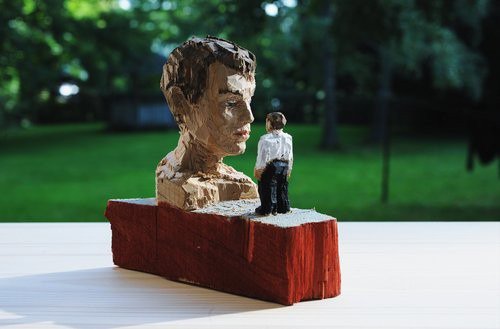Stephan Balkenhol
dal 21/10/2010 al 19/11/2010
Segnalato da
21/10/2010
Stephan Balkenhol
Mai 36 Galerie, Zurich
From larger-than-life to dwarf-like, his men, women, animals, heads and hybrids of human and animal are carved with inseparable pedestals. The artist's figures show no signs of subjective feelings or emotions; they contain no sociological or socio-critical references. Their impact lies in the simple fact of their presence, a presence that eludes definition and brings to light an existential awareness of postmodern life.

Stephan Balkenhol (*1957 in Fritzlar/Germany, lives and works in Karlsruhe, Berlin and Meisenthal, France) ranks among Germany’s most renowned international sculptors. His works, regularly on view internationally since the 1980s, enjoy eye-catching presentation in public space in a number of major cities. The artist has been represented by Mai 36 Galerie since 1989.
Stephan Balkenhol’s rough-hewn polychromatic wood sculptures and reliefs show people and animals as well as hybrid figures and architecture. He began making his trademark figurative sculptures in the mid-1980s. In response to the abstract, minimalist and conceptual strategies of the Hamburg Academy of the Fine Arts, where he studied with Ulrich Rückriem from 1976 to 1982, Balkenhol focused on the craft of sculpting, drawing on a heritage that ranges from early Christian sculpture to Modernism. He uses chisel and hammer to carve his figures straight out of tree trunks (usually poplar) that have been halved or quartered. From larger-than-life to dwarf-like, his men, women, animals, heads and hybrids of human and animal are carved with inseparable pedestals. Marks made by the tools, grooves, fissures and cracks remain visible, testifying to the working process. This does not preclude a strong sense of realism, reinforced by the treatment of contours, the pose of the figures and the way they are painted. Balkenhol creates basic types in countless variations, displaying them alone or in groups. Not only the men and the women but also the animals reveal nothing about themselves; they tell no stories and represent nothing. They are inconspicuous, ageless and difficult to pin down; they show no emotions and appear curiously detached. They are simply there, serenely self-contained, as if gazing into the void; they are always the same and always new. Enigmatic, nameless and timeless, they are both distinctively personal and blandly anonymous. By eschewing psychological implications, the artist brings to the fore archetypical patterns of existence and emotions, so that his figures – especially those in public spaces – also function as mirrors that reflect viewers’ feelings, desires and hopes. The enthronement of nameless people subverts the nature of the monument, for Balkenhol does not honour rulers, heroes and thinkers; instead he celebrates all that is average, ordinary and anonymous. And, in so doing, he has superbly mastered the grand gesture.
The artist’s figures show no signs of subjective feelings or emotions; they contain no sociological or socio-critical references. Their impact lies in the simple fact of their presence, a presence that eludes definition and brings to light an existential awareness of postmodern life. For the exhibition at Mai 36, Stephan Balkenhol has created a new ensemble of sculptures.
[Text: Dominique von Burg | Translation: Catherine Schelbert]
The preview is on Friday, October 22 from 6 to 8 p.m. Stephan Balkenhol will be present.
For visuals, please contact: office@mai36.com.
It is our pleasure to welcome you to the gallery.
Image: © Stephan Balkenhol
Untitled, 2010
cedarwood, colored
ca. 15 x 25 x 5 cm
Opening: Friday, October 22, 2010, 6 to 8 p.m.
Mai 36 Galerie
Ramistrasse 37 - Zurich
Opening hours: Tues - Fri 11 a.m. to 6.30 p.m., Sat 11 a.m. to 4 p.m.



